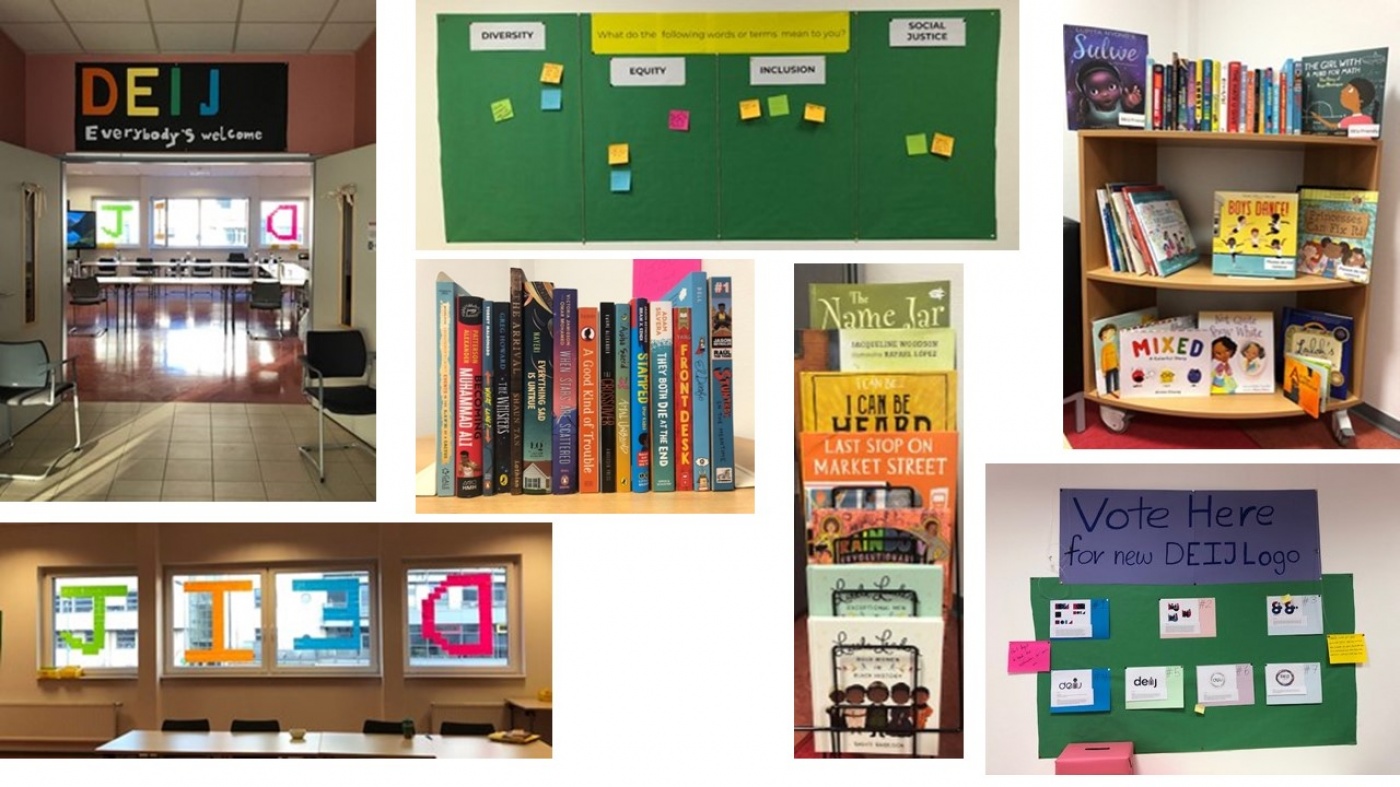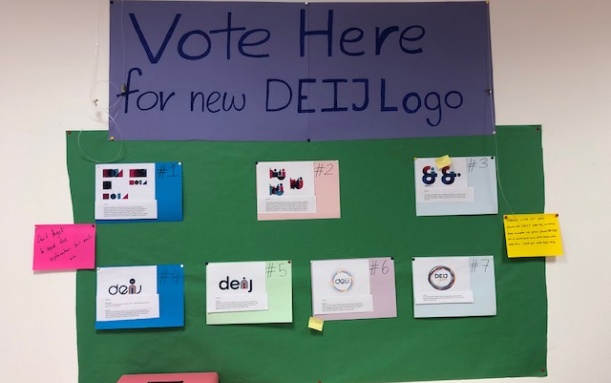

Company name : INTERNATIONAL SCHOOL OF LUXEMBOURG ASBL
Activity sector : Teaching
Company category : Foundation, Non-profit, NGO
Description of the action
The DEIJ Committee adopted the concept of a DEIJ Nest - a room, centrally located in the school, dedicated to the task. In February, 2022, a large, multi-purpose room in our Hillside building was appointed as the DEIJ Nest. The community had received a teaser email a week before about the project, but to avoid any doubt, a large DEIJ was pasted onto the windows, visible from outside, while above the doors a handmade sign stating “DEIJ Nest, Everyone is welcome” was placed. The DEIJ Nest was to be open to all in the community for a period of several weeks.
Context
At the beginning of the 2021-22 school year, the DEIJ Committee (Diversity, Equity,inclusion and Justice Committee) set itself several targets for the year ahead. Amongst these were two crucial developments. Firstly, the need to significantly raise awareness, discourse and understanding regarding DEIJ issues at the school and secondly, the drafting and approval of a schoolwideinclusion Policy.
Objectives
To raise awareness, promote understanding and create a hub for discourse. Members of staff and students were encouraged to visit the nest for lessons, meetings or other events. Additionally, the school hosted Board meetings in the room, and there were several parent meetings planned to take place there. In this way, the room received a significant amount of traffic from the community, thereby raising the profile of DEIJ. Furthermore, the feedback and information that was posted in the room by the community could be used to formulate the all important Diversity Policy and guide the future work of the DEIJ Committee.
Approach
Below you can find photos and examples of the different activities in the DEIJ Nest.
Simple prompts
What do the words Diversity, Equity,inclusion and Social Justice mean to you?
What would you like to ask about DEIJ?
These simple prompts allowed for plenty of feedback by means of sticky notes. This feedback provided information about the level of understanding about DEIJ.
Vote for your favorite DEIJ logo
All good movements need a logo! 8 logos had been designed by a student and a member of the Communications Team. Each design had a short explanation. Students, parents, teachers and administrators loved talking and voting for their favourite. It was interesting to see quite how much debate this promoted. The chosen logo was unveiled at the Spring Festival at the end of April and visitors to the DEIJ stand were able to collect a sticker or badge. You can now see these all over the school.
Write down one word to describe DEIJ
Along with other activities that had taken place during the school year, this will be used to create a giant word cloud that will be printed out and posted in the school.
DEIJ Icebergs
These conceptual activities encouraged visitors to think deeply about DEIJ, in terms of what might be visible or hidden in an inclusive school.
DEIJ Library
Literature has a powerful impact on how we think and view the world, especially for young people as the stories they read and remember as children have a long term impact. As such, the kinds of books children and young adults have access to can significantly shape how we respond to DEIJ issues. As such, with the support of the school’s librarians, a dedicated DEIJ library was curated and placed into the “Cosy Reading Corner” of the Nest. Students and adults alike were able to browse, read and review the different books, each of which deals with or raises questions about DEIJ matters. Over time, members of the community recommended or donated their own books or suggestions to the growing library. The librarians gave book talks about the library too. It was great to see teachers taking their classes to this part of the Nest.
DEIJ Coasters
Our youngest students were given the opportunity to draw little pictures to show when they had felt included on one side of the coaster, or excluded on the other side. These will be brought together in a montage to show their efforts.
Approach:
In the weekly school newsletter, references were made to the latest events in the DEIJ Nest. Increasingly, teachers began taking classes into the room for lessons. Also, some of our Social Action Groups began to host their meetings in the DEIJ Nest. In each case, the concept began to permeate further into the collective consciousness of the institution. It meant that when we reached the Diversity Day in April, everyone in the school had at least some awareness of the importance of DEIJ.
Additionally, the comments and feedback from the DEIJ Nest were used to inform the drafting and development of a school Diversity Policy. This was completed by the DEIJ Committee and members of the school board. This was important as it meant that, to some extent everyone in the organisation had a way to contribute to the discussion in some way.
Impact
This is difficult to gauge at this stage although we know that over 750 members of the school visited the DEIJ Nest. With the new Diversity Policy ratified in May 2022, the real impacts are still to be felt.
« To do »
The concept of a NEST to promote ideas and discourse is not new and is a highly recommended approach to involving a wide range of personnel and members in a discussion. It is suggested to ensure the NEST is a central location in the organisation and bookable for use by individuals and groups. By reporting back to the community what is happening in the NEST and updating the prompts, you improve uptake.
« Not to do »
From our experience, it is important not to expect too much interest initially. It takes time for this to develop traction.
Make sure the NEST is accessible easily for all in the community.
Accept that some of the comments left may be difficult to accept but recognise that this is an important part of the discourse.
Photos
